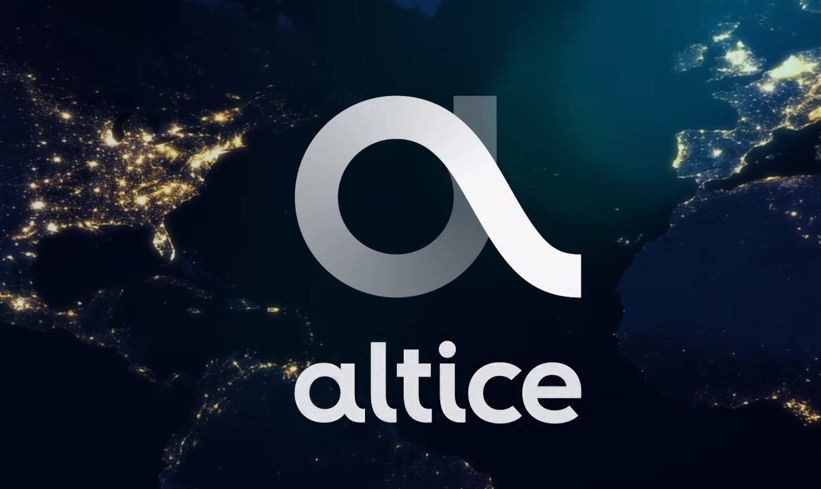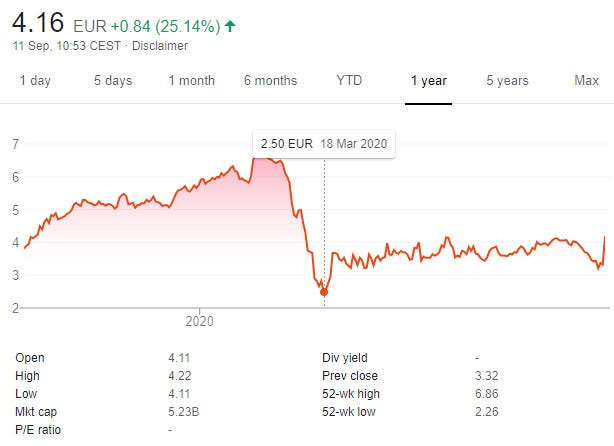Patrick Drahi, the founder and 40% shareholder of telecoms conglomerate Altice Europe, reckons the time is right to take it private.
September 11, 2020

Patrick Drahi, the founder and 40% shareholder of telecoms conglomerate Altice Europe, reckons the time is right to take it private.
Draghi has managed to scrape together enough cash to make a cash offer of €4.11 per share, which represents a premium of 23.8% over the closing price on 10 September 2020 and a premium of approximately 16.5% over the 180 day volume-weighted average price. It should be noted, however, that this premium is flattered by the facts that the share price has been plunging recently and its coronavirus nadir took place just within the 180-day window, as you can see from the Google Finance screen shot below.

“The proposed transaction announced today will result in a new and exciting chapter for Altice Europe and our stakeholders,” said Draghi. “Following the Group reorganization in 2018, Altice Europe has successfully executed on the operational and financial turnaround strategy. Over the same period, Altice Europe has made outstanding progress in simplifying and strengthening its diversified capital structure.
“The proposed ownership structure will enable an increased focus on executing our long-term strategy, and underlines my confidence and conviction in Altice Europe’s prospects. Altice Europe has a unique asset base, fully converged and fibre rich, with a leading position and nationwide fixed and mobile coverage across markets. With my ongoing personal involvement, Altice Europe will maintain the fundamental Altice Model at heart. I am excited to continue leading Altice Europe’s loyal management and their excellent teams. Altice Europe continues to have tremendous opportunities ahead.”
“Right from the start of the process in early August, we have followed a careful, full and thorough process with all four independent non-executive directors and the non-conflicted executive director,” said Jurgen van Breukelen, Chairman of Altice Europe. “Our focus has been on determining the best way forward for Altice Europe and its business, while safeguarding the interests of all stakeholders involved. This transaction will allow Altice Europe to more successfully and effectively achieve its goals in a private and fully owned environment, benefiting from the founder’s ongoing long term commitment to the business.”
Here’s the strategic rationale, as detailed in the announcement.
Increasing the ability of Altice Europe and its subsidiaries (the “Group”) to achieve the goals and implement the actions of its strategy;
Increasing the ability to implement and focus on achieving long-term strategic goals and operational achievements of Altice Europe, as opposed to short-term performance driven by quarterly reporting;
Increasing the ability to achieve an efficient capital structure (notably from a financing perspective), and a simplification of the legal holding structure;
Reducing the Group’s costs (e.g. listing, financial reporting and board costs will decrease and there will no longer be a requirement for physical general meetings of Altice Europe);
As debt providers will focus more on fundamental valuation and credit analysis, having better access to the bond and bank markets independent of the daily and volatile share price fluctuations and thus decrease borrowing costs; and
Avoiding the current volatility of the prices of the Shares, which will (i) enable the opportunity to improve the effectiveness of employee incentive plans, and thus better align the senior management with the business strategy of the Group and improve the retention of the employees of the Group and (ii) improve Altice Europe’s reputation and relationship with clients, employees, finance providers, suppliers and local governments.
This seems like a fairly generic list of reasons to take a public company private, but it’s not immediately obvious why they even bothered to compile it. All shareholders care about, presumably, is whether the offer represents as good an exit strategy for them as they can expect for the foreseeable future. The price premium isn’t huge, but then again the global economy doesn’t look likely to boom any time soon.
“The board of Altice Europe believes the transaction is in the best interest of Altice Europe, its employees, customers, shareholders, debt providers and other stakeholders,” says the announcement. Let’s see if they agree.
About the Author(s)
You May Also Like








.png?width=300&auto=webp&quality=80&disable=upscale)


_1.jpg?width=300&auto=webp&quality=80&disable=upscale)


.png?width=800&auto=webp&quality=80&disable=upscale)